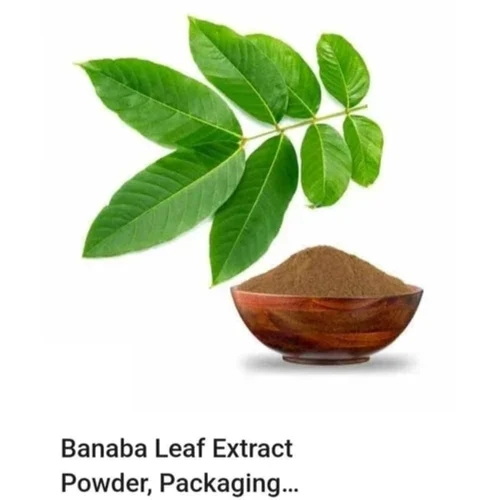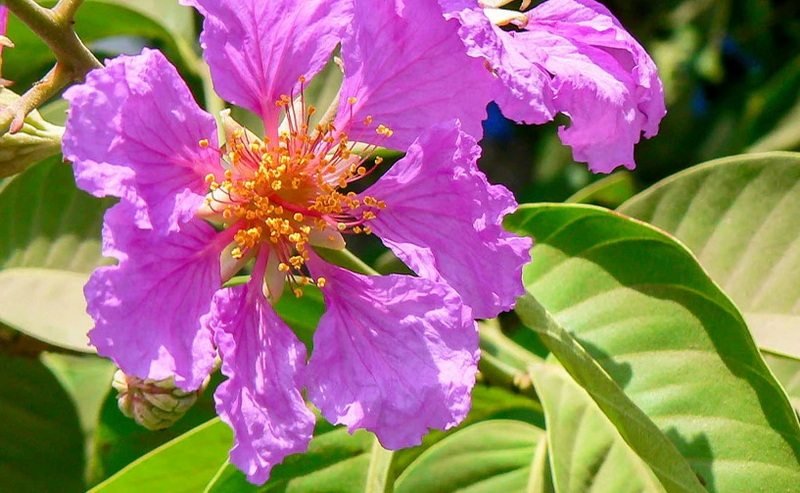Content Menu
● Introduction to Banaba Leaf Extract
>> Corosolic Acid and Its Role
>>> Mechanism of Action
>> Antioxidant Properties
>>> Antioxidant Effects on Heart Health
● Heart Health Benefits of Banaba Leaf Extract
>> Animal and Human Studies
>> Metabolic Syndrome Management
● Potential Risks and Considerations
>> Interactions with Medications
● Synergistic Effects with Other Nutraceuticals
● Conclusion
● FAQs
>> 1. What are the primary compounds in Banaba leaf extract responsible for its health benefits?
>> 2. How does Banaba leaf extract support heart health?
>> 3. Are there any potential interactions with other medications?
>> 4. What forms can Banaba leaf extract be consumed in?
>> 5. Is Banaba leaf extract safe for long-term use?
● Citations:
Banaba leaf extract, derived from the Lagerstroemia speciosa tree native to Southeast Asia, has been traditionally used for its medicinal properties, particularly in managing blood sugar levels and supporting heart health. This article delves into the mechanisms by which Banaba leaf extract contributes to cardiovascular well-being, exploring its potential benefits and the scientific evidence supporting its use.

Introduction to Banaba Leaf Extract
Banaba leaves have been a part of traditional medicine for centuries, recognized for their ability to regulate blood sugar levels and provide antioxidant support. The key compound responsible for these effects is corosolic acid, which mimics insulin by facilitating glucose uptake into cells. Additionally, Banaba leaves contain various polyphenols and ellagitannins that contribute to their health benefits.
Corosolic Acid and Its Role
Corosolic acid is a triterpenoid compound found in Banaba leaves, known for its insulin-like activity. It enhances glucose uptake in cells, thereby reducing blood sugar levels. This action is crucial for individuals with type 2 diabetes, as it helps manage blood glucose levels and mitigate diabetes-related complications, including heart issues.
Mechanism of Action
Corosolic acid works by increasing the cellular uptake of glucose, which is essential for maintaining healthy blood sugar levels. It also improves insulin sensitivity, reducing the risk of developing insulin resistance—a precursor to type 2 diabetes. Furthermore, corosolic acid has been shown to decrease gluconeogenesis, the process by which the liver produces glucose, further contributing to blood sugar regulation.
Antioxidant Properties
Banaba leaves are rich in antioxidants, including polyphenols like pentagalloylglucose (PGG) and ellagitannins. These compounds help protect against oxidative stress, which is linked to various cardiovascular diseases. Oxidative stress can damage blood vessels and the heart, leading to conditions such as atherosclerosis and hypertension.
Antioxidant Effects on Heart Health
Antioxidants in Banaba leaves can neutralize free radicals, reducing inflammation and oxidative damage to cardiovascular tissues. This protective effect is vital for maintaining healthy blood vessels and preventing the progression of heart disease.
Heart Health Benefits of Banaba Leaf Extract
Banaba leaf extract supports heart health through several mechanisms:
1. Blood Sugar Regulation: By lowering blood sugar levels, Banaba leaf extract reduces the risk of diabetes-related heart issues. High blood sugar can lead to vascular damage and increase the risk of heart disease.
2. Cholesterol and Triglyceride Reduction: Studies suggest that corosolic acid and PGG in Banaba leaves may help lower blood cholesterol and triglyceride levels. Elevated cholesterol is a major risk factor for heart disease. For instance, a study involving mice fed a high cholesterol diet showed a significant reduction in blood cholesterol levels when treated with corosolic acid[1][2].
3. Antithrombotic Effects: Banaba leaf extract may help dissolve blood clots, which are a significant risk factor for high blood pressure and stroke. This antithrombotic effect supports cardiovascular health by preventing clot formation[2].
4. Antioxidant Protection: The antioxidants in Banaba leaves protect blood vessels and the heart from oxidative damage, reducing the risk of cardiovascular diseases.
Animal and Human Studies
Animal studies have consistently shown that Banaba extracts and corosolic acid can significantly reduce blood glucose levels and improve lipid profiles. For example, a study in genetically diabetic mice demonstrated that a water-soluble Banaba extract reduced blood glucose and insulin levels, while also lowering triglycerides and hemoglobin A1C levels.
In human studies, a combination of Banaba leaf and turmeric extracts was found to reduce triglyceride levels by 35% and increase HDL (good) cholesterol levels by 14% over a 10-week period[1][2]. These findings suggest that Banaba leaf extract may be beneficial for managing risk factors associated with heart disease.

Metabolic Syndrome Management
Banaba leaf extract has also been studied for its effects on metabolic syndrome, a condition characterized by high blood pressure, insulin resistance, and abnormal lipid profiles. A clinical trial involving patients with metabolic syndrome found that Banaba extract significantly reduced systolic blood pressure, fasting plasma glucose, triglycerides, and very low-density lipoprotein (VLDL) levels[3]. These reductions are crucial for mitigating the risk of cardiovascular disease.
Potential Risks and Considerations
While Banaba leaf extract is generally considered safe, it can interact with conventional diabetic medications, potentially leading to hypoglycemia (low blood sugar). Therefore, individuals with diabetes should consult their healthcare provider before using Banaba leaf supplements.
Interactions with Medications
Banaba leaf extract may enhance the effects of insulin and other diabetes medications, which could result in excessively low blood sugar levels. Monitoring blood glucose levels closely is essential when combining Banaba leaf extract with other treatments.
Synergistic Effects with Other Nutraceuticals
Banaba leaf extract can be combined with other nutraceuticals to enhance its cardiovascular benefits. For instance, a combination of Banaba with red yeast rice, artichoke, and coenzyme Q10 has shown synergistic effects in improving lipid profiles and glucose metabolism[6]. This combination can help reduce total cholesterol, LDL cholesterol, and triglycerides, while also enhancing antioxidant activity.
Conclusion
Banaba leaf extract offers several potential benefits for heart health, primarily through its ability to regulate blood sugar levels, reduce cholesterol and triglycerides, and provide antioxidant protection. While more research is needed to fully understand its effects on cardiovascular health, existing studies suggest that Banaba leaf extract could be a valuable adjunct in managing heart disease risk factors.

FAQs
1. What are the primary compounds in Banaba leaf extract responsible for its health benefits?
The primary compounds include corosolic acid, which mimics insulin, and various polyphenols like pentagalloylglucose (PGG) and ellagitannins, which provide antioxidant effects.
2. How does Banaba leaf extract support heart health?
Banaba leaf extract supports heart health by regulating blood sugar levels, reducing cholesterol and triglycerides, providing antioxidant protection, and potentially preventing blood clot formation.
3. Are there any potential interactions with other medications?
Yes, Banaba leaf extract may interact with diabetes medications, potentially leading to hypoglycemia. It is crucial to consult a healthcare provider before using it alongside other treatments.
4. What forms can Banaba leaf extract be consumed in?
Banaba leaf extract can be consumed as a tea, capsule, or powder. It is also available in combination with other herbal extracts.
5. Is Banaba leaf extract safe for long-term use?
Current research indicates that Banaba leaf extract is safe for use, with no adverse effects reported in animal studies or human clinical trials. However, long-term safety data may require further investigation.
Citations:
[1] https://www.healthline.com/nutrition/banaba-leaf
[2] https://naturmedscientific.com/banaba-leaf/
[3] https://www.liebertpub.com/doi/pdfplus/10.1089/jmf.2021.0039
[4] https://www.jairamdass.com/product/banaba-leaves-extract/
[5] https://esther-mall.com/blogs/news/effects-of-coleus-banaba-leaf-extract-from-blood-sugar-to-weight-control-3-benefits-of-banaba-leaf
[6] https://pmc.ncbi.nlm.nih.gov/articles/PMC5315731/
[7] https://pmc.ncbi.nlm.nih.gov/articles/PMC5067667/
[8] https://www.mdpi.com/1424-8247/18/3/362






























